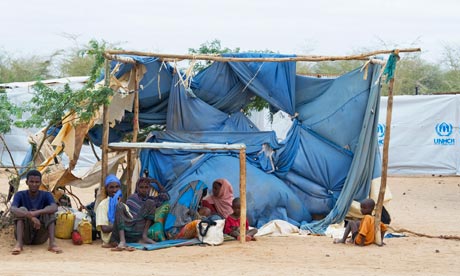Unprecedented sum sought by consolidated appeal process reflects level of concern about 'critical' humanitarian situation

The UN will need $1.5bn next year for life-saving projects in Somalia, and has warned any delay in raising funds could be disastrous for those left destitute by the world's largest humanitarian crisis.
The $1.5bn consolidated appeal process (CAP), or joint appeal, was launched in Nairobi on Tuesday and will fund 350 projects in Somalia, where famine and conflict have already cost tens of thousands of lives. More than half the deaths have been among children.
The 2012 appeal is 50% higher than in 2011, but officials said this reflected a realistic assessment of needs.
Somalia has experienced two decades of conflict. Despite a major humanitarian effort this year, 4 million Somalis, 43% of the population, still lack basic necessities, and 3 million of these are in the al-Shabaab controlled south, where 250,000 people are still affected by famine. Al-Shabaab has banned some aid agencies from operating in areas it controls.
"With the humanitarian situation expected to remain critical well into next year, early and full funding for the CAP 2012 is essential," said Mark Bowden, UN humanitarian co-ordinator for Somalia. "This life-saving plan will only be achieved if donors pledge and commit early."
In the first half of 2011, humanitarian aid to Somalia was not sufficient to meet the country's needs. But after the first formal declaration of famine, on 20 July, funding rose to $572m in just two months. Although this enabled relief agencies to save many lives, humanitarian officials said more could have been done had the money been available earlier.
After relief efforts intensified, the number of people receiving food each month more than trebled, to 2.6 million, and more than 480,000 acutely malnourished children received nutritional supplements. Three of the six areas where famine was declared had improved to pre-famine levels by November.
Kiki Gbeho, head of the UN Office for the Co-ordination of Humanitarian Affairs (Ocha), said the unprecedented size of the 2012 CAP reflected the unprecedented scale of the emergency. The 2011 CAP was $1bn, with 80% of the funding met.
"For 2012, the question is how do we ensure that we maintain the funding flows, how do we ensure that all the partners … stay the course, because we expect the situation to remain dire," said Gbeho.
Bowden was optimistic donors would respond to the new appeal, despite concerns that UN agencies might not be able to reach the most vulnerable people, particularly in the rebel-controlled south.
"Somalia has become synonymous with the largest crisis facing Africa," he said. "It is at the epicentre of the regional crisis and I think donors understand that unless you address Somalia there will be continuing major problems in Kenya and also in Ethiopia."
The top state donors for last year's CAP were the US, Britain and Saudi Arabia. One of the main external contributors was the Organisation of Islamic Co-operation (OIC), which provided 16% of non-CAP funds.
In December, the OIC said the Somali crisis had triggeredunprecedented aid funding from many OIC member states and an unmatched public mobilisation of resources to provide assistance.
There has been some concern that the emergence of new donors and new non-governmental organisations operating in Somalia could complicate relief activities on the ground.
Bowden said more co-ordination was taking place and that donors too needed to establish partnerships among themselves to deal with burden-sharing.
The OIC has signed a memorandum of understanding to better co-ordinate activities with Ocha.
The UN said access remained the biggest challenge in Somalia, adding that organisations taking part in the CAP in 2012 would continue to engage with newer partners, many of whom have increased their activities in the south.
Bruno Geddo, the UN High Commission for Refugees (UNHCR) representative for Somalia, said the 2012 CAP would constitute a "calculated bet" that relief organisations would continue to be able to operate in Somalia despite the al-Shabaab ban and other obstacles to access.
Around 1.4 million Somalis have been displaced within their own country, and more than 900,000 are living as refugees in neighbouring countries such as Kenya and Ethiopia.
Senait Gebregziabher, Oxfam country director for Somalia, anticipated the crisis would last well into 2012. "What is crucial right now is to get enough funding to help people cope with the situation before the next harvest in the spring," she said.
Although donors and the public had committed $1.32bn to Somalia in 2011, this was little more than half the $2.41bn spent by the international community to combat piracy off the coast of Somalia, she noted.
"We know that donors have deep pockets when it comes to their economic interests," said Gebregziabher. "They must now show the same concern and focus for the fate of tens of thousands of Somalis."
No comments:
Post a Comment